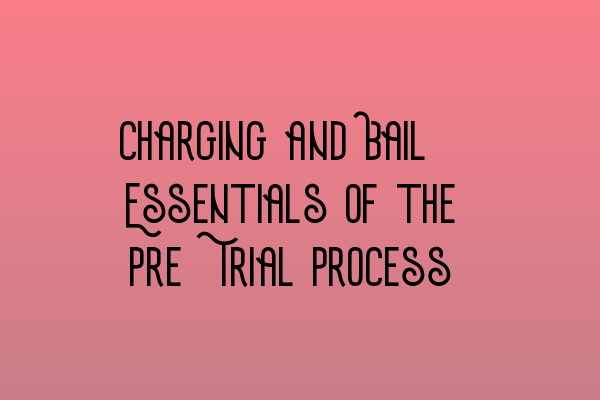Charging and Bail: Essentials of the Pre-Trial Process
Welcome to SQE Criminal Law & Practice Law UK, where we provide comprehensive information and guidance on all aspects of criminal law. In this blog post, we will be delving into the essentials of the pre-trial process, specifically focusing on charging and bail.
The Charging Process
The charging process is a crucial component within the criminal justice system. It involves the formal accusation of an individual committing a crime. Understanding the charging process is essential for both legal professionals and aspiring barristers. To test your knowledge on this topic, you can try our SQE 1 Practice Exam Questions.
In the UK, the Crown Prosecution Service (CPS) is responsible for making decisions about charging an individual with a criminal offense. The CPS reviews evidence gathered by the police, weighs the likelihood of securing a conviction, and decides whether to proceed with charges. This process is guided by the Code for Crown Prosecutors, which sets out the evidential and public interest tests that must be met.
Once the CPS determines that there is sufficient evidence, they will charge the individual with the relevant offense. The charging decision is informed by factors such as the seriousness of the alleged offense, the strength of the evidence, and the public interest. It is important to note that a charge does not equate to guilt but rather acts as a formal accusation to initiate the judicial process.
The Bail Process
Bail is the temporary release of an individual accused of a crime before their trial. The granting of bail is not automatic and is based on several factors. It is a complex process that involves assessing the risk of the accused absconding, interfering with witnesses, or committing further offenses. To better understand the intricacies of the bail process, you can explore our SQE 1 Practice Mocks FLK1 FLK2.
When a person is charged with a criminal offense, the police authorities will decide whether to release them on bail or remand them in custody. The primary consideration is ensuring that the accused attends their court hearings while balancing the need to protect the community and preserve the integrity of the judicial process.
If bail is granted, certain conditions may apply, such as surrendering travel documents, residing at a specific address, or reporting to a police station regularly. These conditions aim to mitigate the risk of the accused interfering with the case or evading justice. It is important for legal practitioners to understand the intricacies of bail to effectively represent their clients during this stage of the pre-trial process.
Conclusion
The pre-trial process, including charging and bail, plays a vital role in the criminal justice system. It is important for legal professionals to have a strong understanding of this process to effectively represent their clients and ensure a fair trial. For those preparing for the SQE exams, our comprehensive SQE 2 Preparation Courses and SQE 1 Preparation Courses can provide the necessary knowledge and skills to excel. Stay updated on the latest SRA SQE Exam Dates to plan your study schedule effectively.
Thank you for visiting our blog! Keep exploring SQE Criminal Law & Practice Law UK for more insightful content and resources.
